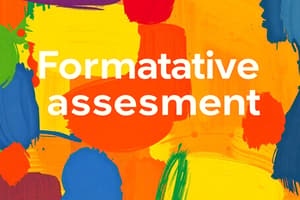Podcast
Questions and Answers
What is the primary purpose of documenting observations in early childhood education?
What is the primary purpose of documenting observations in early childhood education?
- To build relationships with families
- To improve teaching practices
- To identify developmental delays
- To inform educational strategies and interventions (correct)
Regular observations can help identify developmental delays and behavioral issues in children.
Regular observations can help identify developmental delays and behavioral issues in children.
True (A)
Match the benefits of observations with their corresponding descriptions:
Match the benefits of observations with their corresponding descriptions:
Individualize education = Customizes educational experiences Early identification and intervention = Helps identify developmental delays Building relationships = Fosters stronger connections between home and school Engaging families = Improves teaching practices and strategies
Observations only benefit children, not educators.
Observations only benefit children, not educators.
What is an outcome of sharing insights from observations with families?
What is an outcome of sharing insights from observations with families?
Flashcards are hidden until you start studying
Study Notes
Formative Assessment in Early Childhood Education
- Formative assessment starts with systematic and intentional observations to collect specific information about a child's development and behavior.
- Observations are not random, but rather well-planned and structured to ensure focus on the child's learning goals.
Observations in Early Childhood Education
- Observations can be divided into spontaneous and planned, each serving distinct purposes.
- Spontaneous observations occur in the moment, capturing children in their natural states, and provide genuine insights into children's interactions, behaviors, and overall development.
- Planned observations are pre-arranged, focus on specific developmental goals, behaviors, or interactions, and are essential for gathering detailed evidence for thorough assessments and informed planning.
Planned Observations
- Planned observations involve defining the observation focus, preparing the observational environment, observing the child, documenting the observation, analyzing and interpreting the observation, and applying insights from observations to inform educational strategies and interventions.
- Planned observations provide valuable insights into a child's development, helping educators tailor their teaching approaches to meet the unique needs of each child.
Benefits of Observations
- Observations enhance both teaching strategies and student learning experiences by:
- Individualizing education to capture a detailed understanding of each child's unique abilities, interests, and learning styles.
- Enabling early identification and intervention to address developmental delays, behavioral issues, and learning disabilities.
- Building relationships by understanding the social and emotional needs of children.
- Engaging families by sharing insights from observations to foster a strong connection between home and school.
- Contributing to the professional growth of educators by improving teaching practices and strategies.
Tips for Teachers
- Find a quick and effective way to document spontaneous observations to ensure accurate recording of important details.
- Develop a weekly assessment plan to reflect on observations, think about the data gathered, and plan for future observations.
- Use a chart or matrix to keep track of assessment plans and ensure ongoing child assessment.
Studying That Suits You
Use AI to generate personalized quizzes and flashcards to suit your learning preferences.




